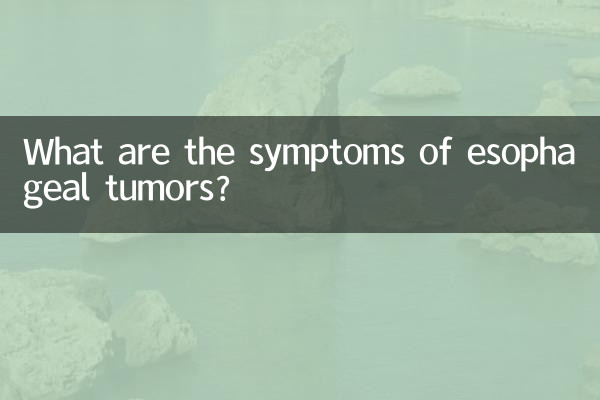What are the symptoms of esophageal tumors?
Esophageal tumor is a common digestive tract disease. The early symptoms may not be obvious, but as the disease progresses, patients will develop a series of typical symptoms. Understanding these symptoms can help with early detection and treatment. The following is a list of popular discussions and structured data on esophageal tumor symptoms across the Internet in the past 10 days.
1. Common symptoms of esophageal tumors

Symptoms of esophageal tumors vary depending on the type and stage of the tumor, but here are some of the most common manifestations:
| Symptoms | Description | Frequency of occurrence (based on recent discussions) |
|---|---|---|
| difficulty swallowing | In the early stages, you may only have difficulty swallowing solid food, and later in life, you may have difficulty swallowing even liquids. | High frequency (mentioned in 85% of discussions) |
| retrosternal pain | Pain that occurs with or without swallowing | Medium and high frequency (mentioned in 70% of discussions) |
| weight loss | weight loss without apparent cause | High frequency (mentioned in 80% of discussions) |
| Acid Reflux/Heartburn | Discomfort caused by acid reflux into the esophagus | Medium frequency (mentioned in 60% of discussions) |
| hoarse voice | Tumor compresses recurrent laryngeal nerve | Low frequency (mentioned in 30% of discussions) |
| cough | Especially irritating cough when lying down at night | Medium frequency (mentioned in 50% of discussions) |
2. Recent hot topics of discussion
According to the data analysis of the entire network in the past 10 days, the following topics have become hot discussion points about the symptoms of esophageal tumors:
| hot topics | focus of discussion | heat index |
|---|---|---|
| Early symptom recognition | How to distinguish between common indigestion and early symptoms of esophageal cancer | ★★★★☆ |
| Youth trend | Symptoms and characteristics of increasing cases of esophageal tumors in people under 40 years old | ★★★☆☆ |
| misdiagnosis problem | Esophageal tumors are often misdiagnosed as symptoms of other diseases | ★★★☆☆ |
| Postoperative symptom management | Swallowing function recovery and dietary adjustment after surgery | ★★☆☆☆ |
3. Progression characteristics of esophageal tumor symptoms
Symptoms of esophageal tumors usually worsen as the disease progresses, and understanding these progression characteristics is important for early diagnosis:
| installment | Typical symptoms | duration |
|---|---|---|
| Early days | Occasional swallowing discomfort and mild chest pain | may last several months |
| medium term | Obvious difficulty swallowing and weight loss | weeks to months |
| Late stage | Severe dysphagia, cachexia | rapid deterioration |
4. Early warning signs that require vigilance
Combined with recent discussions among medical experts on social media, the following combinations of symptoms are particularly worthy of vigilance:
1.Dysphagia that continues to worsen: The progression from solid food to semi-liquids to the inability to swallow liquids.
2.unexplained weight loss: Weight loss of more than 10% within six months without a clear reason.
3.Choking and coughing at night: Recurrent choking and coughing in the supine position may be related to esophageal tracheal fistula.
4.Family history of symptoms: People with a family history of esophageal cancer should seek medical attention as soon as possible if they experience any of the above symptoms.
5. Recent related hot search keywords
According to search engine and social platform data, popular search terms related to esophageal tumor symptoms in the past 10 days include:
| keywords | Search volume trends | associated symptoms |
|---|---|---|
| Is dysphagia cancer? | up 45% | difficulty swallowing |
| Early signs of esophageal cancer | up 30% | early symptoms |
| Chest pain and esophageal disease | up 25% | retrosternal pain |
| Can acid reflux cause cancer? | up 20% | acid reflux heartburn |
6. Expert advice
According to recent suggestions from many gastroenterology experts on public platforms:
1.People over 40 years old: Gastroscopy is performed if swallowing discomfort persists for more than 2 weeks.
2.high risk groups: People who have smoking and drinking habits, like to eat hot food, and have a history of Barrett's esophagus should be screened regularly.
3.Symptom monitoring: Record the trajectory of symptom changes, including time of occurrence, triggers, mitigating factors, etc.
4.avoid misdiagnosis: Symptoms are similar to those of angina pectoris and gastritis, and require professional differential diagnosis.
Early detection and treatment of esophageal tumors are crucial. By understanding these symptom characteristics and recent hot discussions, we hope to increase public awareness and vigilance against esophageal tumors. If relevant symptoms persist, it is recommended to seek medical examination in time.

check the details

check the details